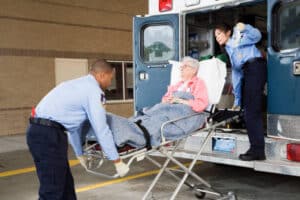
With the rising aging population, senior healthcare services are increasingly critical. One aspect that plays a pivotal role in ensuring reliable access to these services is road safety.
Transportation delays caused by road conditions, traffic, or accidents can hinder timely access to care for seniors, particularly in emergencies. While medical expertise and staff are essential, logistical concerns such as safe and efficient transport to and from care facilities must also be prioritized.
Road Conditions and Healthcare Timeliness
Accessing senior healthcare services often requires reliable and timely transportation. Poor road conditions can lead to delays due to construction, maintenance issues, or weather. For elderly patients, these delays may compromise urgent treatments or daily medical routines.
Healthcare logistics teams must consider road safety when planning transit for patients and supplies, ensuring seniors receive prompt care without interruption due to avoidable transit challenges.
Traffic Congestion and Healthcare Logistics
One major obstacle to accessing healthcare in metropolitan areas is traffic congestion. Heavy traffic can cause delays in staff commutes, patient transports, and medical supply deliveries.
Senior care institutions’ effectiveness is impacted, and individuals with urgent medical requirements may be in danger. To reduce interruptions and ensure the seamless provision of healthcare services, senior care providers need to consider local traffic patterns and road safety regulations.
The Importance of Trucking Permits
When transporting large medical equipment, oversize trucking permits are often required. These permits regulate the movement of trucks that exceed standard size and weight limits, ensuring safety and reducing the risk of accidents.
Securing these permits is crucial for healthcare providers transporting essential medical equipment. In some cases, delays in obtaining permits can slow down healthcare operations, making it necessary for logistical teams to plan and comply with transportation regulations.
Oversize Vehicles in Healthcare Transport
Senior healthcare institutions require enormous equipment, including beds, imaging machines, and dialysis units, frequently requiring larger trucks. Transporting large products securely is crucial, especially in congested locations or small highways.
Oversized vehicles can be dangerous if poor road conditions increase the likelihood of an accident. The logistics of properly moving critical equipment must be carefully controlled to avoid hazardous circumstances and assure timely service.
Widened Load Measures for Healthcare Logistics
Widened load measures are necessary when moving oversized medical equipment. These measures may involve careful route planning, avoiding areas with heavy traffic, or using escort vehicles to guide the trucks.
Healthcare providers and logistics teams must collaborate to ensure transportation adjustments are made to prevent accidents and meet road safety standards. These measures reduce the likelihood of delays and accidents, safeguarding the timely delivery of vital medical supplies to senior care facilities.
Urban Versus Rural Transport Challenges
In urban areas, navigating through crowded streets with oversized vehicles can be challenging due to traffic and narrow roadways. In rural areas, longer travel distances, poorly maintained roads, and inclement weather create different challenges for transporting essential medical equipment.
Both environments pose risks to safe transport and require tailored logistical strategies to ensure the secure and timely arrival of medical supplies and services at senior healthcare facilities.
The Role of Driver Training in Senior Healthcare Logistics
Drivers transporting medical supplies, particularly in oversized vehicles, must undergo specialized training to navigate challenging road conditions safely. This training ensures they understand how to operate large vehicles under various traffic and road safety scenarios.
For healthcare providers, ensuring that drivers are adequately trained and certified helps minimize accidents and avoid delays in transporting essential healthcare supplies to senior care facilities.
The Impact of Permit Delays on Healthcare Access
Delays in obtaining large transportation licenses can substantially impact healthcare delivery services. Senior care facilities rely on prompt delivery of medical equipment, drugs, and supplies. Any delays in these deliveries might interrupt patient treatment schedules, resulting in worse health outcomes for vulnerable elders.
Logistics teams must plan ahead of time to obtain permissions and ensure that transportation is completed on time to prevent disruptions to healthcare services.
Vehicle Readiness and Healthcare Logistics
Maintenance and readiness are critical for vehicles transporting medical equipment to senior healthcare facilities. Regular inspections and adherence to safety standards ensure vehicles are fully prepared for the road, reducing the risk of breakdowns or accidents.
Ensuring vehicle readiness is part of a comprehensive approach to healthcare logistics, allowing providers to minimize transit delays and improve overall access to senior care services.